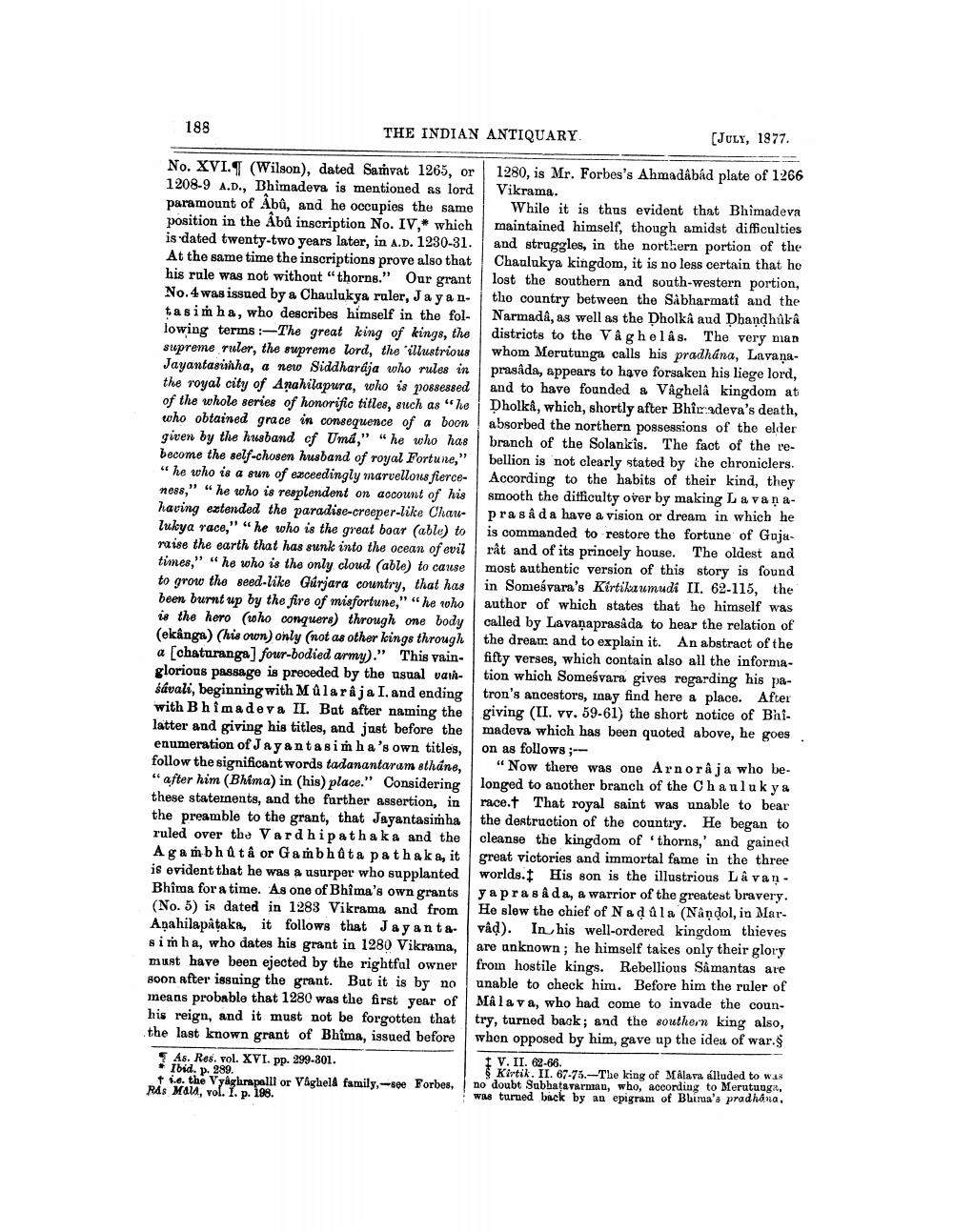________________
188
THE INDIAN ANTIQUARY
(JULY, 1877.
No. XVI. (Wilson), dated Samvat 1265, or 1280, is Mr. Forbes's Ahmadábád plate of 1266 1208-9 A.D., Bhimadeva is mentioned as lord Vikrama. paramount of Abû, and he occupies the same While it is thus evident that Bhimadeva position in the Abû inscription No. IV, which maintained himself, though amidst difficulties is dated twenty-two years later, in A.D. 1230-31. and struggles, in the northern portion of the At the same time the inscriptions prove also that Chaulukya kingdom, it is no less certain that he his rule was not without "thorns." Our grant lost the southern and south-western portion, No.4 was issued by a Chaulukya ruler, Ja ya n. the country between the Sábharmatî and the tasimha, who describes himself in the fol- Narmada, as well as the Dholka aud Dhandhûkâ lowing terms --The great king of kings, the districts to the Våghelâs. The very man supreme ruler, the supreme lord, the 'illustrious whom Merutunga calls his pradhana, LavanaJayantasinha, a new Siddharája who rules in prasada, appears to have forsaken his liege lord, the royal city of Anahilapura, who is possessed and to have founded & Vaghelâ kingdom at of the whole series of honorific titles, such as "he Dholkå, which, shortly after Bhîc adeva's death, toho obtained grace in consequence of a boon absorbed the northern possessions of the elder given by the husband of Umd," "he who has branch of the Solankis. The fact of the rebecome the self-chosen husband of royal Fortune," bellion is not clearly stated by the chroniclers. "he who is a sun of exceedingly marvellons fierce- According to the habits of their kind, they ness," "he who is resplendent on account of his | smooth the difficulty over by making Lavanahaving extended the paradise-creeper-like Chau- praså da have a vision or dream in which he lukya race," "he who is the great boar (able) to is commanded to restore the fortune of Gujaraise the earth that has sunk into the ocean of evil rât and of its princely house. The oldest and times," "he who is the only cloud (able) to cause most authentic version of this story is found to grow the seed-like Gúrjara country, that has in Someśvara's Kirtikaumudi II. 62-115, the been burnt up by the fire of misfortune," "he roho author of which states that he himself was is the hero who conquers) through one body called by Lavanaprasada to hear the relation of (ekânga) (his oron only (not as other kings through the dream, and to explain it. An abstract of the a [chaturanga) four-bodied army)." This vain- fifty verses, which contain also all the informaglorious passage is preceded by the usual vann- tion which Someśvara gives regarding his paśávali, beginning with Malaraja I. and ending tron's ancestors, may find here a place. After with Bhimadeva II. Bat after naming the giving (II. vv. 59-61) the short notice of Bhilatter and giving his titles, and just before the madova which has been quoted above, he goes enumeration of Jayantasimha's own titles, on as follows:--- follow the significant words tadanantaram sthane, "Now there was one Arnorâja who be"after him (Bhima) in (his) place." Considering longed to another branch of the Chauluk ya these staternents, and the further assertion, in race. That royal saint was unable to bear the preamble to the grant, that Jayantasimha the destruction of the country. He began to ruled over the Vardhipathaka and the cleanse the kingdom of 'thorns,' and gained Aga mbh ut å or Gambhůta pathaka, it great victories and immortal fame in the three is evident that he was a usurper who supplanted worlds. f His son is the illustrious L & van. Bhîma for a time. As one of Bhîma's own grants | yapra sâda, a warrior of the greatest bravery. (No. 5) is dated in 1283 Vikrama and from He slew the chief of Nadala (Nândol, in MarAşahilapitaka, it follows that Jayanta vad). In his well-ordered kingdom thieves simha, who dates his grant in 1280 Vikrama, are unknown; he himself takes only their glory must have been ejected by the rightful owner from hostile kings. Rebellious Sâmantas are soon after issuing the grant. But it is by no unable to check him. Before him the ruler of means probable that 1280 was the first year of Mala va, who had come to invade the counhis reign, and it must not be forgotten that try, turned back; and the southern king also, the last known grant of Bhîma, issued before whon opposed by him, gave up the idea of war. 45. Res, vol. XVI. pp. 299-301.
IV. II. 62-66 • Ibid. p. 299.
Kirtik. II. 67-75.-The king of Malara alluded to wa3 t i.e. the Vyághrapalll or Vaghela family,-see Forbes, no doubt Subhatavarman, who, according to Merutunga, Rås Mau, vol. 1. p. 198.
was turned back by an epigram of Bhina'a prodhona,




